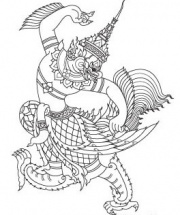Difference between revisions of "Talion"
| Line 20: | Line 20: | ||
Image:talion.jpg|Lara finding the Talion | Image:talion.jpg|Lara finding the Talion | ||
</gallery> | </gallery> | ||
| + | |||
| + | ==Miscellaneous facts== | ||
| + | [[Image:Garudadrawing.jpg|thumb|right|180px|Garuda]] | ||
| + | The basis for the Guardian of the Talion may be a Tibetan mythological creature called "Garuda". Originally the Indian version of Garuda, the "chief of feathered creatures", was represented as a large bird. Later his form assumed that of a "bird-man" - Tibetan iconography depicts Garuda with the upper torso and arms of a man, the head, beak and legs of a bird, and large wings which unfold from his back, shoulders or forearms. Blow the waist his feathered thighs terminate in ostrich like lower legs, with large clawed feet ending in sharp talons (The Encyclopedia of Tibetan Symbols and Motifs By Robert Beer). | ||
| + | |||
<br clear="all" /> | <br clear="all" /> | ||
Revision as of 13:24, 4 November 2008
The Talion is the key to unlocking the door to the Temple of Xian, in Tomb Raider II. It was stored in the Ice Palace underneath Barkhang Monastery. The Talion was guarded by an ice beast, the Guardian of the Talion.
The Guardian of the Talion
The Guardian of the Talion is a bird creature with yeti-like features you must fight at the climax of Ice Palace in Tomb Raider II.
When you fight him, you can either choose jumping around like mad, using grenades or the Uzis. However it is recommended, that you retreat to a depression, inside the temple or onto the roof of the temple from where you can take out the Guardian using pistols.
The Guardian appears in a different colour in Tomb Raider II Gold.
Gallery
Miscellaneous facts
The basis for the Guardian of the Talion may be a Tibetan mythological creature called "Garuda". Originally the Indian version of Garuda, the "chief of feathered creatures", was represented as a large bird. Later his form assumed that of a "bird-man" - Tibetan iconography depicts Garuda with the upper torso and arms of a man, the head, beak and legs of a bird, and large wings which unfold from his back, shoulders or forearms. Blow the waist his feathered thighs terminate in ostrich like lower legs, with large clawed feet ending in sharp talons (The Encyclopedia of Tibetan Symbols and Motifs By Robert Beer).




